|
Help |
Site Map
|
Scout Report ... Pride and Prejudice On Open Bookshelf, Biological Macromolecules, Iranica, Volcanism, Phantom Islands, English Playbooks, Chemistry of Life, Logic Problems and Brain Teasers
RESEARCH AND EDUCATION
Back to Top |
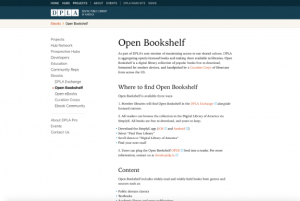 |
|
DPLA: OPEN BOOKSHELF
|
LANGUAGE ARTS |
|
|
|
On June 21, 2018, the Digital Public Library of America (DPLA) introduced Open Bookshelf, a one-stop shop for hundreds of e-books that are freely available online. This collection, which currently features over 1,000 books, includes titles that are in the public domain along with titles that are Creative Commons licensed. These titles are selected by the Curation Corps, a team of librarians from across the country that includes public, school, and academic librarians. The books available on Open Bookshelf reflect the diversity of the Curation Corps: the collection features classical literature (including Pride and Prejudice and Little Women), textbooks, academic titles, and children's books. Visitors may browse this collection by language or genre (e.g. science fiction, education & study aids, and computers). Individual users can access Open Bookshelf through SimplyE, a free mobile application. Open Bookshelf is also available to participating libraries through the DPLA Exchange. [MMB]
|
|
|
|
|
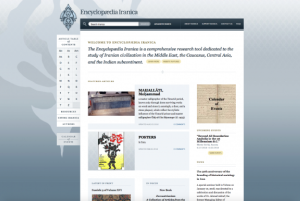 |
|
ENCYCLOPAEDIA IRANICA
|
SOCIAL STUDIES |
|
|
|
From Columbia University's Center for Iranian Studies comes Encyclopaedia Iranica, a peer-reviewed encyclopedia dedicated to Iranian history and culture. The encyclopedia, which was launched in print in 1982 and has been online since 1996, is currently edited by Professor Elton Daniel and an international team of 38 scholars, including scholars of linguistics, central Asian art & archeology, and modern Central Asia. Meanwhile, the encyclopedia's entries are penned by over 1,000 scholars, providing readers with access to a breadth of expertise. Visitors can perhaps best explore the encyclopedia through the advanced search option, which includes an option to browse by topic (including biographies, flora and fauna, music, and material culture). As of this write-up, Encyclopaedia Iranica is in the process of developing subject tags to facilitate easier browsing - readers are invited to submit appropriate subject tags. Finally, visitors may want to check out the resources section, which features links to other digital projects that may be of interest, including the Afghanistan Encyclopedia, the Digital Persian Archive, and Women's Worlds in Qajar Iran, to name just a few. [MMB]
|
|
|
|
|
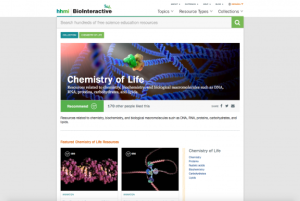 |
|
HHMI BIOINTERACTIVE: CHEMISTRY OF LIFE
|
SCIENCE |
|
|
|
For instructors of chemistry and biology, the Howard Hughes Medical Insitute's BioInteractive collection offers this compilation of resources "related to chemistry, biochemistry, and biological macromolecules such as DNA, RNA, proteins, carbohydrates, and lipids." In total, Chemistry of Life includes 78 resources, including animated videos, hands-on classroom activities, interactive videos, three-dimensional models, and more. Visitors can best browse these items by selecting the View All Chemistry of Life Resources link at the bottom of this page. From here, visitors can filter resources by topic (e.g., biochemistry; nutrition, mechanism), by resource type (e.g., animation, 3D model, instructor resource), or by curriculum (including AP Biology, Common Core, Next Generation Science Standards-Life Science). Each resource is accompanied by a short description. Many of the more extensive educational resources in this collection also are also accompanied by a list of relevant NGSS, AP Biology, and IB Biology standards. [MMB]
|
|
|
|
|
 |
|
CRASH COURSE MEDIA LITERACY
|
EDUCATIONAL TECHNOLOGY |
|
|
|
Launched in February 2018, Crash Course Media Literacy is one of the newest additions to the popular YouTube series launched by vlogging brothers John and Hank Green. This recent series is hosted by veteran vlogger and radio host Jay Smooth and addresses a range of topics that touch on a number of academic disciplines. As Jay Smooth notes in the first episode of this series, "[a]s a field of study, media literacy comprises and overlaps many different theories and subjects from critical thinking and psychology to linguistics and ethics in technology." Individual episodes in this series address issues including the history of print journalism, the work of Marshall McLuhan, confirmation bias, advertising, and disinformation. This series may be of interest to social studies, journalism, and psychology instructors, as well as librarians. [MMB]
|
|
|
|
|
 |
|
DATABASE OF EARLY ENGLISH PLAYBOOKS
|
ARTS |
|
|
|
For scholars of fifteenth, sixteenth, and seventeenth-century English literature, the Database of Early English Playbooks (DEEP) is "[a]n easy-to-use and highly customizable search engine of every playbook produced in England, Scotland, and Ireland from the beginning of printing through 1660." This database was created by Alan B. Farmer, an English professor at The Ohio State University and Zachary Lesser, an English professor at the University of Pennsylvania. The pair created the very first version of this database in 1999 when they were graduate students at Columbia University interested in "the marketing of authorship and theatricality on the title pages of early modern English playbooks." Since then, the pair has collaborated with a number of programmers and designers to create the current version of DEEP. Today, the database includes single-play playbooks as well as collections (books that contain plays). Researchers may want to start by perusing the How to Use DEEP page, which provides a helpful tutorial of the specific search fields that can be used to explore this database. In addition, scholars can download all data contained in DEEP in HTML, XML, or CSV format. [MMB]
|
|
|
|
|
 |
|
NOTCHES: (RE)MARKS ON THE HISTORY OF SEXUALITY
|
SOCIAL STUDIES |
|
|
|
Founded in January 2014, NOTCHES is a self-described "peer-reviewed, collaborative and international history of sexuality blog that aims to get people inside and outside the academy thinking about sexuality in the past and in the present." The blog is edited by an international team of scholars and publishes a variety of blog posts. Most blog posts illuminate a specific aspect of the history of sexuality, often accompanied by related images or video clips. For instance, in one recent post, historian Rebecca Jennings writes about the experiences of lesbian women in Australia during the post-World War II era. NOTCHES also publishes a number of interviews with scholars who have recently published books related to the history of sexuality. In one recent interview, historian Jerry T. Watkins III discusses his recent book Queering the Redneck Riviera: Sexuality and the Rise of Florida Tourism. Visitors can browse previous blog posts by subject tags such as historiography, masculinity, and cultural history. [MMB]
|
|
|
|
|
 |
|
MINNESOTA LITERACY COUNCIL: GED: SCIENCE
|
SCIENCE |
|
|
|
From the Minnesota Literacy Council (check out the 07-29-2016 Scout Report) comes this complete curriculum to help students prepare for the science portion of the General Equivalency Diploma (GED). Although these printable resources are designed specifically for GED teachers, they may also be of interest to K-12 science instructors. This curriculum is organized into a series of units including earth and space science, physical science, and life science. Within each of these units, instructors can download a sequence of complete lesson plans, accompanied with ready-to-go student handouts. Many of these individual lessons include links to additional resources that may be of interest to instructors. In addition, this collections features a number of short instructional videos. [MMB]
|
|
|
|
|
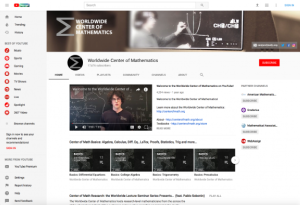 |
|
YOUTUBE: WORLDWIDE CENTER FOR MATH
|
MATHEMATICS |
|
|
|
For mathematics instructors and students, the mathematics publishing company Worldwide Center for Math offers a number of instructional videos related to upper-level mathematics, including algebra, trigonometry, and precalculus. These videos are perhaps best browsed by playlist. One playlist, Think Thursday, features a series of short videos that present logic problems and brain teasers accompanied by a demonstration of how one might approach these problems. These short videos may especially appeal to mathematics instructors looking for warm-up activities. Other playlists include Musimathics: Music & Math; Basics: Proof; and the History of Greek Mathematics. [MMB]
|
|
|
|
|
GENERAL INTEREST
Back to Top |
 |
|
BLACK GOSPEL MUSIC RESTORATION PROJECT: ROYCE-DARDEN COLLECTION
|
ARTS |
|
|
|
In February 2005, Baylor University English professor Robert Darden penned an essay for The New York Times op-ed section entitled "Gospel's Got the Blues." In this essay, Darden noted that although gospel music has enduring popularity, a number of early gospel recordings are at risk of disappearing. This editorial inspired philanthropist Charles M. Royce to donate funds to the university to launch the Black Gospel Music Restoration Project. Over the past several years, the project has digitized thousands of early gospel recordings. In 2016, the Smithsonian's National Museum of African-American History and Culture featured a number of items from the Black Gospel Music Restoration Project in their Musical Crossroads exhibit. Gospel music fans can also listen to these recordings on the project's homepage. The collection includes a number of recordings dating back to the 1950s and 1960s, including songs by C.L. Franklin, Mahalia Jackson, and the Staple Singers. In the Publicly Accessible Audio section, visitors can browse these recordings by artist, date, publisher/record label, or original format (e.g., 33 �x2153 rpm, 45 rpm, etc.). [MMB]
|
|
|
|
|
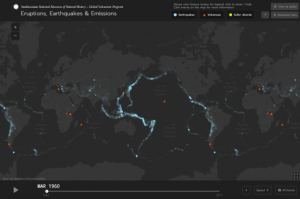 |
|
ERUPTIONS, EARTHQUAKES, AND EMISSIONS
|
SCIENCE |
|
|
|
In 2016, the Global Volcanism Program at the Smithsonian National Museum of Natural History released "Eruptions, Earthquakes, and Emissions." The project presents "a time-lapse animation of volcanic eruptions and earthquakes since 1960." In addition, this animation also incorporates data about sulfur dioxide emissions from volcanic eruptions for every year since 1978, which is when such data first became available thanks to the introduction of satellites to monitor sulfur dioxide emissions. As viewers watch this animation, they may click on icons to view more information about specific earthquakes or volcanic explosions. Visitors interested in further exploring this data about volcanic eruptions, earthquakes, and sulfuric emissions may download these respective datasets in a CSV or GeoJSON file. [MMB]
|
|
|
|
|
 |
|
MIT MEDIA LAB: MLTALKS
|
SCIENCE |
|
|
|
Founded in 1985, the MIT Media Lab is dedicated to supporting interdisciplinary (or "antidisciplinary") research and to "the study, invention, and creative use of digital technologies to enhance the ways that people think, express, and communicate ideas, and explore new scientific frontiers." As part of this mission, the organization hosts a number of MLTalks, which are public interviews with a range of experts that include scholars, writers, doctors, artists, and others. On MIT Media Lab's website, interested visitors can listen to and view recordings of previous MLTalks. In one recent talk, MIT Media Lab Associate Director Andrew Lippman talks to historian and New Yorker contributor Jill Lepore about the history of evidence. In another recent talk, Joe Paradiso of the Media Lab interviews science fiction writer Neal Stephenson. Each MLTalk is approximately ninety minutes in length and features a short lecture by the featured guest, followed by a robust interview and question and answer period. [MMB]
|
|
|
|
| Pages: 1 · 2
Culture and Arts, Relationships and Going Places, Art and Museums, History, Culture Watch, Learning, Senior Women Web, Articles, Sightings, What's New
|
|

















